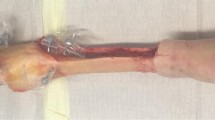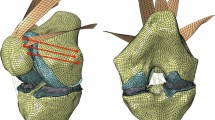Abstract
Patella infera is a known complication of high tibial osteotomy (HTO) that can cause anterior knee pain due to excessive stresses associated with abnormal patellofemoral (PF) joint biomechanics. However, the translation of these abnormal biomechanics to native cartilage pressure has not been explored. The present study was designed to compare the PF contact pressures of three different HTOs in a human cadaveric model of valgus tibiofemoral correction. Nine fresh cadaveric knees underwent (1) medial opening wedge (OWHTO) with a proximal tuberosity osteotomy (PTO), (2) OWHTO with a distal tuberosity osteotomy (DTO), and (3) a lateral closing wedge (CWHTO). The specimens were mounted in a custom knee simulation rig, with muscle forces being simulated using a pulley system and weights. The PF contact pressure was recorded using an electronic pressure sensor at 15°, 30°, 60°, 90°, and 120° of knee flexion, with results of the intact knees obtained as relative control. Compared to the intact knee, the DTO OWHTO and CWHTO did not significantly (P > 0.05) influence PF pressure at any flexion angle. On the other hand, PTO OWHTO lead to a significant elevation in PF cartilage pressure at 30° (P < 0.05), 60° (P < 0.005), and 90° (P < 0.0005) knee flexion. We conclude from these results that DTO OWHTO maintains normal joint biomechanics and has no significant effect on PF cartilage pressure. In patients who complain of pre-existing anterior knee pain, DTO OWHTO or CWHTO should be considered.




Similar content being viewed by others
References
Adili A, Bhandari M, Giffin R, Whately C, Kwok DC (2002) Valgus high tibial osteotomy comparison between an Ilizarov and a Coventry wedge technique for the treatment of medial compartment osteoarthritis of the knee. Knee Surg Sports Traumatol Arthrosc 10:169–176
Agneskirchner JD, Hurschler C, Stukenborg-Colsman C, Imhoff AB, Lobenhoffer P (2004) Effect of high tibial flexion osteotomy on cartilage pressure and joint kinematics: a biomechanical study in human cadaveric knees Winner of the AGA-DonJoy award 2004. Arch Orthop Trauma Surg 124:575–84
Ahmed (1988) The effect of quadriceps tension characteristics on the patellar tracking pattern. In: Presented at 34th annual meeting ORS, Atlanta
Amendola A, Rorabeck CH, Bourne RB, Apyan PM (1989) Total knee arthroplasty following high tibial osteotomy for osteoarthritis. J Arthroplasty 4(Suppl):S11–S17
Andriacchi TP, Mundermann A, Smith RL, Alexander EJ, Dyrby CO, Koo S (2004) A framework for the in vivo pathomechanics of osteoarthritis at the knee. Ann Biomed Eng 32:447–457
Berman AT, Bosacco SJ, Kirshner S, Avolio A Jr (1991) Factors influencing long-term results in high tibial osteotomy. Clin Orthop Relat Res 192–208
Brouwer RW, Bierma-Zeinstra SM, van Koeveringe AJ, Verhaar JA (2005) Patellar height and the inclination of the tibial plateau after high tibial osteotomy. The open versus the closed-wedge technique. J Bone Joint Surg Br 87:1227–1232
Bullough PG (1992) The pathology of osteoarthritis. WB Saunders, Philadelphia, pp 39–69
Cameron HU, Park YS (1996) Total knee replacement following high tibial osteotomy and unicompartmental knee. Orthopedics 19:807–808
Carter DR, Beaupre GS, Wong M, Smith RL, Andriacchi TP, Schurman DJ (2004) The mechanobiology of articular cartilage development and degeneration. Clin Orthop Relat Res S69–S77
Coventry MB (1979) Upper tibial osteotomy for gonarthrosis. The evolution of the operation in the last 18 years and long term results. Orthop Clin North Am 10:191–210
Coventry MB, Bowman PW (1982) Long-term results of upper tibial osteotomy for degenerative arthritis of the knee. Acta Orthop Belg 48:139–156
Coventry MB, Ilstrup DM, Wallrichs SL (1993) Proximal tibial osteotomy. A critical long-term study of eighty-seven cases. J Bone Joint Surg Am 75:196–201
Dejour H, Neyret P, Boileau P, Donell ST (1994) Anterior cruciate reconstruction combined with valgus tibial osteotomy. Clin Orthop Relat Res 220–228
Elias JJ, Wilson DR, Adamson R, Cosgarea AJ (2004) Evaluation of a computational model used to predict the patellofemoral contact pressure distribution. J Biomech 37:295–302
Engel GM, Lippert FG 3rd (1981) Valgus tibial osteotomy: avoiding the pitfalls. Clin Orthop Relat Res 137–143
Flahiff CM, Kraus VB, Huebner JL, Setton LA (2004) Cartilage mechanics in the guinea pig model of osteoarthritis studied with an osmotic loading method. Osteoarthritis Cartilage 12:383–388
Gaasbeek RD, Sonneveld H, van Heerwaarden RJ, Jacobs WC, Wymenga AB (2004) Distal tuberosity osteotomy in open wedge high tibial osteotomy can prevent patella infera: a new technique. Knee 11:457–461
Gill TJ, DeFrate LE, Wang C, Carey CT, Zayontz S et al (2003) The biomechanical effect of posterior cruciate ligament reconstruction on knee joint function. Kinematic response to simulated muscle loads. Am J Sports Med 31:530–536
Goutallier D, Hernigou P, Medevielle D, Debeyre J (1986) Outcome at more than 10 years of 93 tibial osteotomies for internal arthritis in genu varum (or the predominant influence of the frontal angular correction). Rev Chir Orthop Reparatrice Appar Mot 72:101–113
Goutallier D, Julieron A, Hernigou P (1992) Cement wedge replacing iliac graft in tibial wedge osteotomy. Rev Chir Orthop Reparatrice Appar Mot 78:138–144
Hasler EM, Herzog W (1998) Quantification of in vivo patellofemoral contact forces before and after ACL transection. J Biomech 31:37–44
Hernigou P, Goutallier D (1987) Outcome of the femoropatellar joint in osteoarthritic genu varum after tibial wedge osteotomy for angulation 10 to 13 year regression. Rev Chir Orthop Reparatrice Appar Mot 73:43–48
Hernigou P, Ma W (2001) Open wedge tibial osteotomy with acrylic bone cement as bone substitute. Knee 8:103–110
Hernigou P, Medevielle D, Debeyre J, Goutallier D (1987) Proximal tibial osteotomy for osteoarthritis with varus deformity. A ten to thirteen-year follow-up study. J Bone Joint Surg Am 69:332–354
Hoell S, Suttmoeller J, Stoll V, Fuchs S, Gosheger G (2005) The high tibial osteotomy, open versus closed wedge, a comparison of methods in 108 patients. Arch Orthop Trauma Surg 125:638–643
Hofmann AA, Kane KR (1994) Total knee arthroplasty after high tibial osteotomy. Orthopedics 17:887–890
Huberti HH, Hayes WC (1984) Patellofemoral contact pressures The influence of q-angle and tendofemoral contact. J Bone Joint Surg Am 66:715–724
Hughston JC, Deese M (1988) Medial subluxation of the patella as a complication of lateral retinacular release. Am J Sports Med 16:383–388
Insall JN (1981) Patella pain syndromes and chondromalacia patellae. Instr Course Lect 30:342–356
Insall JN, Joseph DM, Msika C (1984) High tibial osteotomy for varus gonarthrosis. A long-term follow-up study. J Bone Joint Surg Am 66:1040–1048
Islam N, Haqqi TM, Jepsen KJ, Kraay M, Welter JF et al (2002) Hydrostatic pressure induces apoptosis in human chondrocytes from osteoarthritic cartilage through up-regulation of tumor necrosis factor-alpha, inducible nitric oxide synthase, p53, c-myc, and bax-alpha, and suppression of bcl-2. J Cell Biochem 87:266–278
Jackson JP, Waugh W (1974) The technique and complications of upper tibial osteotomy. A review of 226 operations. J Bone Joint Surg Br 56:236–245
Jackson M, Sarangi PP, Newman JH (1994) Revision total knee arthroplasty. Comparison of outcome following primary proximal tibial osteotomy or unicompartmental arthroplasty. J Arthroplasty 9:539–542
Jakob RP, Jacobi M (2004) Closing wedge osteotomy of the tibial head in treatment of single compartment arthrosis. Orthopade 33:143–152
Kaper BP, Bourne RB, Rorabeck CH, Macdonald SJ (2001) Patellar infera after high tibial osteotomy. J Arthroplasty 16:168–173
Katz MM, Hungerford DS, Krackow KA, Lennox DW (1987) Results of total knee arthroplasty after failed proximal tibial osteotomy for osteoarthritis. J Bone Joint Surg Am 69:225–233
Li G, DeFrate LE, Zayontz S, Park SE, Gill TJ (2004) The effect of tibiofemoral joint kinematics on patellofemoral contact pressures under simulated muscle loads. J Orthop Res 22:801–806
Li G, Park SE, DeFrate LE, Schutzer ME, Ji L et al (2005) The cartilage thickness distribution in the tibiofemoral joint and its correlation with cartilage-to-cartilage contact. Clin Biomech (Bristol, Avon) 20:736–744
Lobenhoffer P, Agneskirchner J, Zoch W (2004) Open valgus alignment osteotomy of the proximal tibia with fixation by medial plate fixator. Orthopade 33:153–160
Lobenhoffer P, Agneskirchner JD (2003) Improvements in surgical technique of valgus high tibial osteotomy. Knee Surg Sports Traumatol Arthrosc 11:132–138
Lootvoet L, Massinon A, Rossillon R, Himmer O, Lambert K, Ghosez JP (1993) Upper tibial osteotomy for gonarthrosis in genu varum. Apropos of a series of 193 cases reviewed 6 to 10 years later. Rev Chir Orthop Reparatrice Appar Mot 79:375–384
Marti RK, Verhagen RA, Kerkhoffs GM, Moojen TM (2001) Proximal tibial varus osteotomy. Indications, technique, and five to twenty-one-year results. J Bone Joint Surg Am 83-A:164–170
Matthews LS, Goldstein SA, Malvitz TA, Katz BP, Kaufer H (1988) Proximal tibial osteotomy. Factors that influence the duration of satisfactory function. Clin Orthop Relat Res 193–200
Mont MA, Alexander N, Krackow KA, Hungerford DS (1994) Total knee arthroplasty after failed high tibial osteotomy. Orthop Clin North Am 25:515–525
Mont MA, Antonaides S, Krackow KA, Hungerford DS (1994) Total knee arthroplasty after failed high tibial osteotomy. A comparison with a matched group. Clin Orthop Relat Res 125–30
Morrell KC, Hodge WA, Krebs DE, Mann RW (2005) Corroboration of in vivo cartilage pressures with implications for synovial joint tribology and osteoarthritis causation. Proc Natl Acad Sci USA 102:14819–14824
Naudie D, Bourne RB, Rorabeck CH, Bourne TJ (1999) The Install Award. Survivorship of the high tibial valgus osteotomy A 10- to -22-year followup study. Clin Orthop Relat Res 18–27
Noda T, Yasuda S, Nagano K, Takahara Y, Namba Y, Inoue H (2000) Clinico-radiological study of total knee arthroplasty after high tibial osteotomy. J Orthop Sci 5:5–36
Noyes FR, Mayfield W, Barber-Westin SD, Albright JC, Heckmann TP (2006) Opening wedge high tibial osteotomy: an operative technique and rehabilitation program to decrease complications and promote early union and function. Am J Sports Med 34(8):1262–1273
Powers CM, Lilley JC, Lee TQ (1998) The effects of axial and multi-plane loading of the extensor mechanism on the patellofemoral joint. Clin Biomech (Bristol, Avon) 13:616–624
Rudan JF, Simurda MA (1990) High tibial osteotomy. A prospective clinical and roentgenographic review. Clin Orthop Relat Res 251–256
Scuderi GR, Windsor RE, Insall JN (1989) Observations on patellar height after proximal tibial osteotomy. J Bone Joint Surg Am 71:245–248
Shea JD (1973) Osteoarthrosis of the knee: diagnosis and complications of treatment by high tibial osteotomy. South Med J 66:1030–1034
Stoffel K, Stachowiak G, Kuster M (2004) Open wedge high tibial osteotomy: biomechanical investigation of the modified Arthrex Osteotomy Plate (Puddu Plate) and the TomoFix Plate. Clin Biomech (Bristol, Avon) 19:944–950
Tigani D, Ferrari D, Trentani P, Barbanti-Brodano G, Trentani F (2001) Patellar height after high tibial osteotomy. Int Orthop 24:331–334
Toksvig-Larsen S, Magyar G, Onsten I, Ryd L, Lindstrand A (1998) Fixation of the tibial component of total knee arthroplasty after high tibial osteotomy: a matched radiostereometric study. J Bone Joint Surg Br 80:295–297
Trindade MC, Shida J, Ikenoue T, Lee MS, Lin EY et al (2004) Intermittent hydrostatic pressure inhibits matrix metalloproteinase and pro-inflammatory mediator release from human osteoarthritic chondrocytes in vitro. Osteoarthr Cartil 12:729–735
Vanwanseele B, Eckstein F, Knecht H, Stussi E, Spaepen A (2002) Knee cartilage of spinal cord-injured patients displays progressive thinning in the absence of normal joint loading and movement. Arthr Rheum 46:2073–2078
Warden SJ, Morris HG, Crossley KM, Brukner PD, Bennell KL (2005) Delayed- and non-union following opening wedge high tibial osteotomy: surgeons’ results from 182 completed cases. Knee Surg Sports Traumatol Arthrosc 13:34–37
Westacott CI, Urban JP, Goldring MB, Elson CJ (2002) The effects of pressure on chondrocyte tumour necrosis factor receptor expression. Biorheology 39:125–132
Westrich GH, Peters LE, Haas SB, Buly RL, Windsor RE (1998) Patella height after high tibial osteotomy with internal fixation and early motion. Clin Orthop Relat Res 169–174
Windsor RE, Insall JN, Vince KG (1988) Technical considerations of total knee arthroplasty after proximal tibial osteotomy. J Bone Joint Surg Am 70:547–555
Wright JM, Heavrin B, Begg M, Sakyrd G, Sterett W (2001) Observations on patellar height following opening wedge proximal tibial osteotomy. Am J Knee Surg 14:163–173
Author information
Authors and Affiliations
Corresponding author
Rights and permissions
About this article
Cite this article
Stoffel, K., Willers, C., Korshid, O. et al. Patellofemoral contact pressure following high tibial osteotomy: a cadaveric study. Knee Surg Sports Traumatol Arthr 15, 1094–1100 (2007). https://doi.org/10.1007/s00167-007-0297-9
Received:
Accepted:
Published:
Issue Date:
DOI: https://doi.org/10.1007/s00167-007-0297-9




